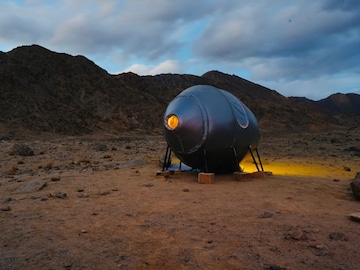
In a groundbreaking initiative, the Indian Space Research Organisation (ISRO) has launched India’s first analogue space mission in the breathtaking landscapes of Leh, Ladakh. This ambitious project aims to simulate conditions similar to those found on extraterrestrial bodies, providing valuable insights for future space exploration.
The Mission Overview
Launched on October 30, 2023, the mission is designed to study the physiological and psychological effects of extended stays in space-like environments. With a focus on preparing for potential missions to the Moon and Mars, the project seeks to understand how humans can sustain themselves in extreme conditions, both physically and mentally.
The analogue mission involves a carefully selected team of astronauts, scientists, and researchers who will live in a specially constructed habitat for a duration of 14 days. This environment mimics the harsh conditions of space, including limited resources, isolation, and communication delays, thus providing a realistic framework for testing human endurance and adaptability.
Scientific Goals
The primary objectives of the mission include:
- Human Behavior and Performance: Researchers will monitor the crew’s psychological and physiological responses to confinement and isolation. This data will help in formulating strategies to support astronauts on long-duration missions.
- Resource Management: The team will practice sustainable living by managing resources such as water, food, and energy, essential for survival in space.
- Technology Testing: Advanced life support systems and habitat technologies will be tested to ensure their reliability for future interplanetary missions.
- Biological Research: The mission will also focus on studying the impact of space-like conditions on human health, including sleep patterns, stress levels, and overall well-being.
Location and Significance
Leh, with its rugged terrain and high-altitude environment, provides a unique backdrop that closely resembles conditions on celestial bodies like Mars. The choice of location reflects ISRO’s commitment to leveraging India’s diverse geographical features for space research.

This mission marks a significant step forward for India’s space ambitions, as it aligns with global efforts to explore beyond Earth. By simulating extraterrestrial environments, ISRO is not only enhancing its own capabilities but also contributing to the broader scientific community’s understanding of human factors in space exploration.
Future Prospects
As ISRO prepares for ambitious missions to the Moon and Mars, the insights gained from this analogue space mission will play a crucial role in shaping future strategies. The data collected will inform the design of life support systems, habitat modules, and mission protocols, ensuring that astronauts are equipped to face the challenges of deep space.
Conclusion
The launch of India’s first analogue space mission in Leh signifies a pivotal moment in the country’s journey towards becoming a key player in space exploration. As ISRO continues to push the boundaries of what is possible, this mission will provide invaluable lessons for future endeavors, paving the way for a new era of interplanetary travel and exploration.
With its sights set on the stars, India is not just dreaming of exploring the cosmos; it is actively preparing to make those dreams a reality.
